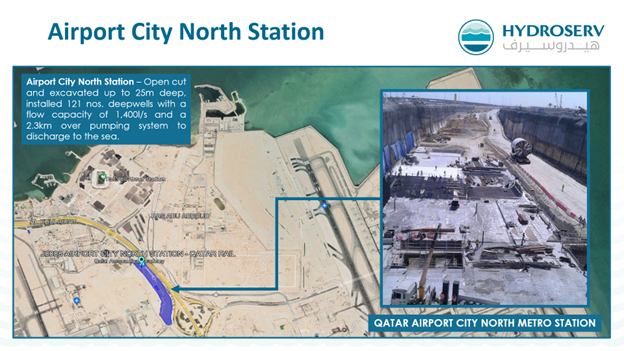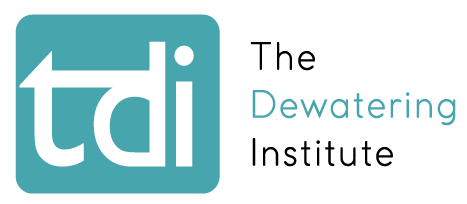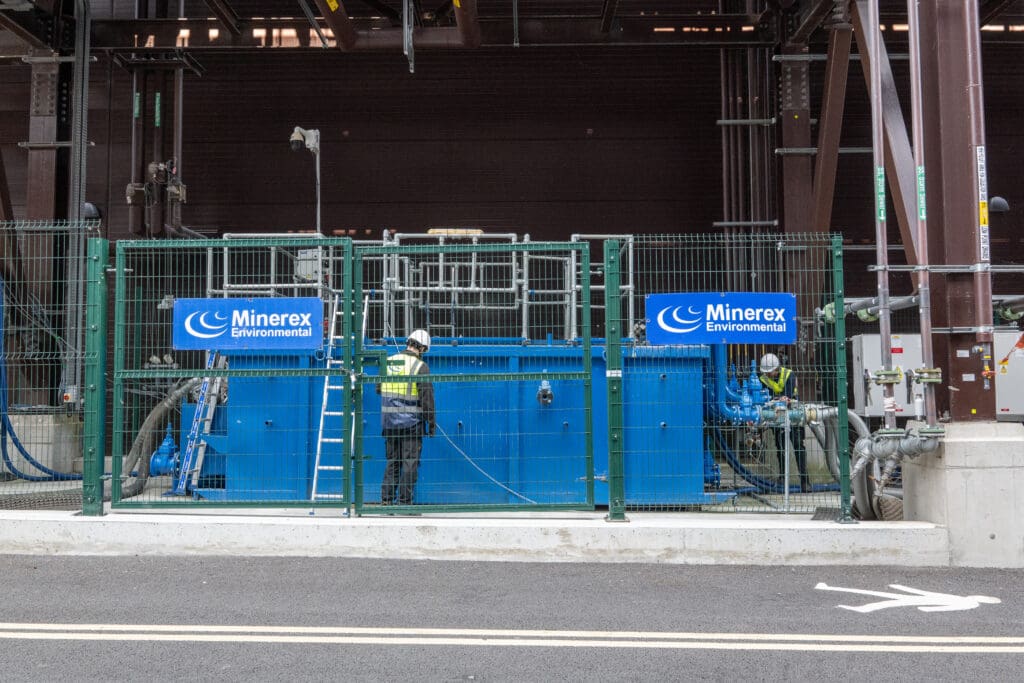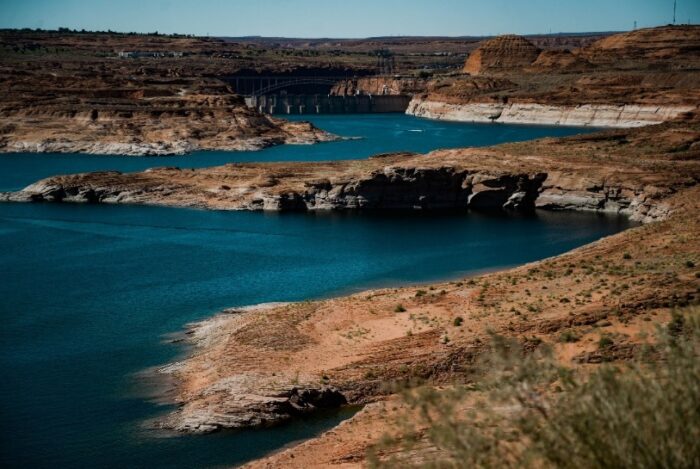As part of The Dewatering Institute‘s commitment towards both knowledge sharing and the appreciation of the great achievements of our members, TDI is developing a series of monthly interviews of industry leaders, and professionals from different parts of the world. This month’s edition features Barry O’Sullivan from Hydroserv WLL.
Barry has wide-ranging experience in leading design teams on bidding and successfully delivering multidisciplinary projects related to hydrogeology, dewatering, over pumping, drilling and remediation. He has over 15 years’ experience in dewatering projects in Europe and the Middle East and is Head of Business Development and portfolio diversification. Barry is a founder of Hydroserv establishing the company in Qatar in 2014, later establishing sister companies Drillserv and Siteserv in 2017.
Barry is a Fellow of the Institution of Civil Engineers, CEng FICE, has a Masters in Hydrogeology from University of Stratchclyde, along with Bachelor Degrees in Civil and Structural Engineering from Munster Technical University.
Share a bit of your background and tell us about your dewatering history, how did you get into the industry?
I grew up on a farm on the southwest coast of Ireland and I always had a love and interest for machinery, water and geology. As a teenager I would spend my summer holidays working on a salmon farm and driving tractors where I learnt a lot about the intricacies of water and geology when it comes to agriculture. When the time came to go to university, I naturally chose to study Civil Engineering.
I came into the dewatering industry purely by chance when, while wondering what to focus on for my dissertation, my university lecturer suggested “Dewatering Deep Basements” as an idea for my thesis. The rest, as they say, is history. I have been working in the Middle East for the last fifteen years and the time has flown by. I now can boast to having a wonderful wife, two lovely daughters, a cat and over a thousand dewatering projects under my belt.
In your opinion, what has been the biggest development in the industry through the years?
As the world continuously moves towards finding and implementing sustainable solutions for infrastructure, this has meant a large number of projects are now being carried out deep underground to allow for more sustainable outputs such as: shorter journey times, gravity drainage and the use of above ground areas for green purposes. This approach alone has created huge opportunities for growth, development, and evolution in the dewatering industry.
We invariably grow through challenges and situations that lead us to finding and implementing new approaches to doing things. As long as there is a Civil Engineering industry there will always be a need for dewatering projects. But just like all other industries, we too need to move with the times and play our part in making sure there is a planet for us to leave behind for our children, and our children’s children. This development has helped the dewatering industry look to the future in new ways.
What are the biggest challenges that you’ve seen in the industry over the past few years, and what do you foresee as potential challenges in the future?
As with all industries the Covid-19 pandemic has been a huge challenge, and thankfully all our staff members have made it through in good health. We, in the dewatering industry, were fortunate in some respects as delayed projects often meant the dewatering operations had to be extended allowing some revenue to be maintained while other industries unfortunately had their revenues wiped out during lockdowns.
Looking ahead I am curious to see how the industry responds to the need to be more sustainable and environmentally conscious. In the past we have often borrowed and implemented technology from other industries, such as oil and gas. I think the need to find greener options will allow the dewatering industry to come together and try to tackle the challenge of sustainability as a team. Perhaps TDI can take the lead?
When looking back over the years, what would you say are your most memorable moments?
My years with Hydroserv have brought so many great memories that it is almost impossible to narrow it down to two. What I can say is that the best part is sharing all the fulfilling achievements we have made as a team; a team made up of an amazing group of people. The Hydroserv team is absolutely remarkable at what they do, and I am incredibly proud of what they have achieved, and what they continue to achieve. Spending each day with them is a memory alone, one that I will always cherish.
I have lost count of the number of times I have looked into a large excavation and said to the team we “will never do anything of this scale again”, but then as little as six months later we would do just that. The 8th project we ever undertook was a Metro Station for Qatar Rail, this was one of these very large-scale projects, and seeing the TBM arrive on site after a successful dewatering application is one of these many fantastic memories.

What would you recommend to the new generations coming into this industry and why?
I would start by congratulating them on making such an excellent career choice. I recall in my early days being concerned that dewatering was too specialized a profession, but now I realize that it is unique insofar that it relies heavily on the experience and expertise of a team of people when conceptualizing and ultimately achieving a successful dewatering project.
Other professions are changing rapidly due to technological advances, such as structural engineering etc. which is changing the landscape of employment sustainability within those industries. The Dewatering Industry actually plays an intricate part in assisting the development of infrastructure that is needed to support and sustain all these technological advances within other industries. So, choosing dewatering as a career path has a high potential to lead to a guaranteed job for life.
If you could give the younger version of yourself one piece of advice, what would it be?
Don’t worry, it will all be ok, every problem has a solution, and thankfully you are never working alone. The support, encouragement and learning that you will receive from your team will make no challenge too big. Even though it may seem impossible at the start, nothing really is impossible. Worry adds no value to your life or to any challenge, it only makes it worse, so trust in yourself and your team and will be just fine.
You have successfully set up a number of businesses over the years, what ventures do you foresee undertaken by a conventional dewatering company in the future?
As the global movement towards green and sustainable solutions continues, I believe most conventional dewatering companies are going to achieve growth geographically. Ideally, and personally, I would like Hydroserv to grow in this way to somewhere exotic like the Seychelles or Virgin Islands. I would happily look after either of those branches!
There is a big movement in the civil engineering industry focusing on carbon neutral goals. How does this affect our industry, and how do you see this being addressed in a future that you specialize in?
Firstly, I expect it is the responsibility of any business to carry out their work in a sustainable fashion. When dealing with our core business of dewatering and bypass works this is being achieved through creating and developing sustainable designs, and by utilizing the most energy efficient plants and equipment.
Secondly, geothermal and carbon capture wells are becoming part of our sustainable solutions creating more and more opportunities for growth within the industry, particularly when it comes to drilling.
Why do you consider TDI to be important?
No organization has ever managed to bring so many practitioners from the dewatering industry together before, so it is an exceptional achievement.
What’s more is that this was achieved during the pandemic, making it an even bigger feat. So, I am confident that TDI will grow from strength to strength as the world returns to normal, as other industries, particularly the travel industry, and economies in general begin to reopen and recover, hopefully staying open.
We work in an industry that has no uniform standards so it is important that an organization can take the lead in producing a set of standards and guidelines that ensures our craft is carried out to the highest levels by qualified consultants, suppliers, and contractors. I believe TDI is achieving this and will only continue to do so.







